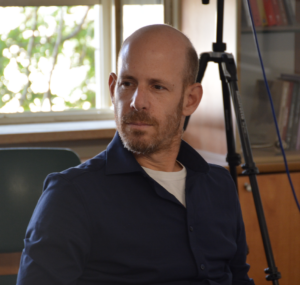Kobi Kabalek
338 Burrowes Building
Education:

Biography:
I earned my Ph.D. in history from the University of Virginia, with a dissertation on “The Rescue of Jews and the Memory of Nazism in Germany” (2013). In 2014-2017 I was a post-doctoral fellow at the Hebrew University in Jerusalem as part of the ERC project “Experience, Judgment, and Representation of WWII in an Age of Globalization,” and examined conflicting perspectives concerning the war in Mandatory Palestine and their impact on the postwar historiography of Israel and Zionism. My research focuses on historical perceptions, moral sentiments, and memory in film, literature, auto/biography, oral narratives, art, etc., in German, Israeli, and global Holocaust history. I currently explore marginalized and extreme phenomena in Holocaust testimonies, historical writing, and popular culture – with special attention to the role of fantasy, imagination, and horror – and their impact on our understanding and representation of the Holocaust.
Recent Publications:
The book Rescue and Remembrance: Imagining the German Collective after Nazism will be published January 2025 with the University of Wisconsin Press.
https://uwpress.wisc.edu/Books/R/Rescue-and-Remembrance
“’The exception proves the rule’ in Israeli commemorations of the ‘Righteous Among the Nations’,” Journal of Israeli History
https://www.tandfonline.com/doi/full/10.1080/13531042.2025.2498829
“No Moment of Peace: Terror, Panic, and Horror in Responses to Nazi Violence against Jews, 1933 and 1938,” forthcoming in Holocaust and Genocide Studies.
“The Nazi Whip: Terror and Pain in the Artworks of Former Nazi Camp Inmates,” in Ella Falldorf and Verena Krieger, eds., “To Tear These Images from Time”: Exploring Visual Representations from Nazi Camps, Ghettos, and the Holocaust (forthcoming).
“An Interview with Henry ‘Hank’ Greenspan,” The Journal of Holocaust Research 38: 1 (2024): 74-86.
“Between Nationalism and Internationalism: Robert Weltsch and the Colonial Dilemma in WWII Palestine,” AJS Review 48: 1 (2024): 77-99.
(Together with Nimrod Zinger) “Angels of Destruction (Mal’akhei Ḥabalah): Two Millennia of Jewish Horror,” European Journal of Jewish Studies 17 (2023): 1-26.
(Together with Ella Falldorf) “Meaningful Work: Cultural Frameworks of Forced Labour in Accounts of Nazi Concentration Camp Inmates,” German History 41: 1 (2023): 41-66.
“Ghosts, Vampires, Zombies,” in Gerd Sebald et al., eds., Handbuch Sozialwissenschaftliche Gedächtnisforschung/Handbook of Social Science Memory Research (Wiesbaden: Springer Verlag, 2023).
“‘Jungle Law Reigned among the Prisoners’: The Meaning of Cannibalism in the Testimonies of Nazi Concentration Camps’ Survivors,” Heritage, Memory and Conflict Journal 3 (2023): 71-74.
“‘Other Germans’: Exceptions and Rules in the Memory of Rescuing Jews in Postwar Germany,” Central European History 55: 3 (2022): 390-409.
„Emotionen der Distanzierung: Deutsche Historikerinnen und Historiker schreiben über die Rettung verfolgter Juden im Holocaust,“ Dubnow Institute Yearbook xix (2020/2021): 33-53.
“Commemorating Failure: Unsuccessful Rescue of Jews in German Film and Literature, 1945-1960,” German History 38: 1 (2020): 96-112.
“Monsters in the Testimonies of Holocaust Survivors,” in Iris Idelson-Shein and Christian Wiese, eds., Monsters and Monstrosity in Jewish History: From the Middle Ages to Modernity (London: Bloomsbury, 2019), 134-153.
“Sexy Zombies? On the Improbable Possibility of Loving the Undead,” in Aylin Basaran, Julia B. Köhne, Klaudija Sabo, and Christina Wieder, eds., Sexualität und Widerstand: Internationale Filmkulturen und Literaturen (Vienna: Mandelbaum, 2018), 322-333.
“What Is the Context of Memory?,” in Gerd Sebald and Jatin Wagle, eds., Theorizing Social Memories: Concepts and Contexts (New York: Routledge 2016), 171-183.
“Edges of History and Memory: The ‘Final Stage’ of the Holocaust,” Dapim: Studies on the Holocaust 29: 3 (2015): 240-263.
“DDR-Soziologie und die (Nicht)Thematisierung der NS-Zeit,” in Michaela Christ and Maja Suderland, eds., Soziologie und Nationalsozialismus: Positionen, Debatten, Perspektiven (Berlin: Suhrkamp, 2014), 263-284.
“Memory and Periphery – An Introduction,” Hagar – Studies in Culture, Polity, and Identities 12 (Winter 2014): 7-22.